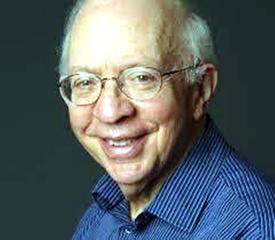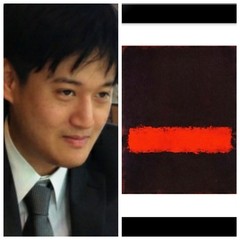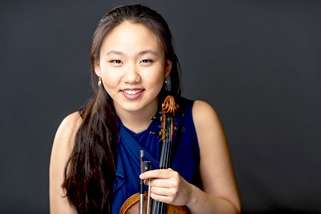|
Back
Other Worldly Ecstacy New York
Peter Jay Sharp Theater, Juilliard School
10/02/2018 -
Sunbin Kim: Four Studies on Darkness–After Mark Rothko (World Premiere)
Josefino Chino Toledo: Agos (World Premiere)
Akira Nishimura: Mirror of Stars (American premiere orchestrated version)
Virko Baley: Violin Concerto No. 1
Regina De Vera (Narrator), Stella Chen (Violinist), Alvin Zhu (Pianist)
New Juilliard Ensemble, Joel Sachs (Conductor)

J. Sachs
“Silence is so accurate.”
Mark Rothko
That phrase “New Juilliard Ensemble” is inaccurate. Joel Sachs, the founding director and conductor, last night conducted four “new Juilliard Ensembles” with four totally different ensembles of musicians. But since these musicians were advanced Juilliard students, and since the music had virtually no prior hearings in America, and since Mr. Sachs never fails to convince...well, one must assume that each work had an unbeatable performance.
This was typical Sachs programming. The compositions came from four countries, in Asia and East Europe. Only one composed, the 80-year-old Virko Baley was vaguely known to me, the others were cyphers. The styles were different, ranging from a multi-styled violin concerto to the very first performance here of Tagalog/Sprechtstimme.
The latter, Josefino Chino Toledo’s Agos was based around a poem by Joi Barrios-Leblanc, spoken and sung in the original Tagalog by one of the Philippines’ rising young actors, Regina De Vera. That poem was about the 2013 hurricane Yolanda, which killed thousands of people on the island of Leyte. It was highly emotional. I am no judge of Tagalog poetry, but the writer’s English translation dealt, of course, with the stench of corpses, with a enigmatic “Forget the president who walks out” and with an apology for anger.
Ms. De Vera gave an equally emotional reading in Tagalog, so emotional that it resembled Schoenberg’s Survivor from Warsaw. Musically, Mr. Toledo varied each verse with consummate skill Initially an orchestral rolling and roaring, then what sounded like a Luzon folk song, followed by more tumult and more folk material.
Since this probably reflected the words, I cannot judge it, but Ms. De Vera gave it a theatrical heft.

K. Sunbin/M. Rothko: Black, Black on Red
The opening work, by Korean-born pianist-composer Sunbin Kim tackled an insoluble paradox: how does one take the most “abstract” of paintings, and complement the original creation with music?
Literal pictures are not a problem (listen to Martinů’s ecstatic Frescos), and Rothko has been evoked by Haskell Small and of course Morton Feldman. Mr. Kim, though, took the most dark of Rothko’s late paintings, giving them, for the painting above, a lampblack setting. Bass clarinet, tuba, low trombone and low strings took Rothko’s blackness to a setting more fit for Dante’s Inferno. In fact, by the second movement, entrance of flute and celesta were like sighs of relief, helped by the swirling piano work by Tristan Tao. The almost jaunty third movement of “green and blue” was followed by the last painting by Rothko before he died. Mr. Kim thankfully didn’t return to his tubas, but had a tam-tam to serve as the bass for this well-composed work.
For sheer unblemished beauty, Akira Nishimura’s Mirror of Stars could not have been surpassed. I had previewed the original piano version, which could have been written by Takemitsu. Except that Mr. Nishimura was never ashamed to go all out on the sustaining pedal, altering the moods with alacrity.
Did it really need a chamber ensemble to enhance the original? Alvin Zhu’s piano was luxurious enough alone, but the Juilliard Ensemble offered a lapidary introduction, and remained in the background for the rest of the all too short atmospheric work.

S. Chen (Courtesy of the Arts)
For sheer originality, for depth, for music which needed no extraneous title, the Ukrainian-American composer Virko Baley gave us a Violin Concerto which balanced on the cusp of Estonian-Gorecki minimalism, East European folk tune, layers of ecstasy–and a massive bass drum cadenza by Simon Herron.
Soloist Stella Chen is one of the superb young violinists of today, yet this was no ordinary virtuoso concerto. Starting with a Hebraic theme, continuing with a Dies Irae which shook the rafters, and a Lux Aeterna where Ms. Chen’s lyrical low strings vibrated with emotion and feeling, one felt the subtitle (“quasi una fantasia”) was most appropriate. Not that it was improvised, but that it seemed pure inspiration, echoing with cavernous resonating dancing by Ms. Chen on the low strings, against celesta and harpsichord harp and vibraphone with rhythms both Latin and Eastern European, the first three movements jumped and rang and rumbled and issued mystical violin mantras.
As for the finale, Mr. Baley presented more wild folk-tropes, desolate melodies, all somehow placed together, for an ending of multifarious glittering emotion.
Harry Rolnick
|